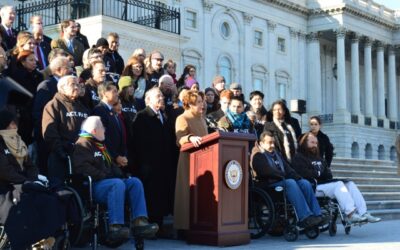Immigration Reform
The last time Congress updated our legal immigration system was November 1990, one month before the World Wide Web went online. We are long overdue for comprehensive immigration reform.
Through immigration reform, we can provide noncitizens with a system of justice that provides due process of law and a meaningful opportunity to be heard. Because it can be a contentious and wide-ranging issue, we aim to provide advocates with facts and work to move bipartisan solutions forward. Read more about topics like legalization for undocumented immigrants and border security below.
Immigrant Entrepreneurs are Investors in their Communities
Cedric Francois, a medical researcher from Belgium, came to Louisville, Kentucky, after hearing that researchers there were beginning work on the first hand transplant. Later, he co-founded two pharmaceutical companies. Suhas Kulkarni, an immigrant entrepreneur himself who founded Louisville-based IT firm Omnisys, understands the need for integrating and helping immigrant entrepreneurs get their start and is leading the area’s new Refugees and Immigrants Succeeding in Entrepreneurship (RISE) initiative. This is a collaborative effort among public and private organizations to support immigrants and refugees in the entrepreneurial endeavors in the Louisville area. RISE recognizes that Louisville “has an untapped pool of talent for city-wide economic development in the form of immigrants and refugees” and that “this population has the potential of becoming drivers of economic growth” for the region. Immigrant entrepreneurs are often vital assets in communities. They start businesses, create jobs, and encourage community revitalization efforts. Immigrant businesses can help revive dilapidated or aging retail corridors. And they provide an opportunity for immigrants to reinvest in the area. Take for example Vilmar Zenzen, originally from Brazil, who is opening a new upscale Brazilian steakhouse in downtown Louisville. Zenzen already operates another Brazilian steakhouse in Knoxville, Tennessee. Read More

State Lawmakers Push for Reforms to Make College Affordable for Young Immigrants
The movement for in-state tuition for undocumented immigrants got off to a quick start in 2014 when Virginia state Del. Alfonso H. Lopez (D) introduced the Virginia Tuition Equality Act. This is the third time Lopez has attempted to pass the bill, which would permit undocumented residents to pay in- state tuition rates. During the 2013, legislative session, one Virginia House committee approved the measure before it died in another committee. “In 2013, it got further than it has ever gotten,” Lopez told the Richmond Times-Dispatch. “That’s why I am optimistic; I think we got great momentum”: Read More

California Court Rules Undocumented Immigrant Can Be a Licensed Attorney
The California Supreme Court ruled last week that Sergio Garcia, a Mexican undocumented immigrant who has spent more than 17 years living in the U.S., should be licensed to practice law in the state of California. In the unanimous decision, California Chief Justice Tani Cantil-Sakauye wrote it is “extremely unlikely” that Garcia would be deported under current immigration policy. "Under these circumstances, we conclude that the fact that an undocumented immigrant's presence in this country violates federal statutes is not itself a sufficient or persuasive basis for denying undocumented immigrants, as a class, admission to the State Bar," she wrote. Read More

Top Five Immigration Stories from 2013
From the beginning, it was clear that 2013 was going to be a big year for immigration. The results of the 2012 Presidential Election were widely interpreted as a rebuke to Mitt Romney’s enforcement-only “self-deportation” policy, and President Obama’s huge victory among minority communities was seen as a… Read More

Class Action Settlement Removes Obstacles Preventing Asylum Applicants from Working
A recent settlement agreement in a class action lawsuit brought on behalf of thousands of asylum seekers is removing obstacles they faced in obtaining work documents while they pursue their asylum claims. The inability to work for lengthy periods of time has had crippling effects on asylum applicants. Without proper work authorization, they have been vulnerable to exploitation by unscrupulous employers, have been unable to pay for the legal assistance they need, have had to rely on family members and community organizations for financial help, and generally have felt unwelcome in a country that claims to offer them protection. Read More

Licensing Barriers Leave Immigrant Doctors Driving Cabs Instead of Practicing Medicine
Instead of putting foreign medical and other advanced degrees to use in the United States, it is common among immigrant doctors and other professionals to work less skilled jobs, such as a taxi driver or waiter, because the complicated licensing process keeps them from applying their training in the U.S. market. According to a recent Migration Policy Institute (MPI) series of reports on improving credential recognition, the United States is experiencing a “brain waste” by preventing immigrants living in the country from efficiently transferring their foreign credentials. MPI’s most recent report concludes their series by exploring prospects for international recognition of foreign qualifications. Read More

Senate Confirms New DHS Director, Jeh Johnson
The Senate approved Jeh Johnson as the Department of Homeland Security Secretary 78 to 16 on Monday night. President Obama nominated Johnson to head the department in October following former Sec. Janet Napolitano’s resignation. At one point, Sen. John McCain (R-AZ) said he would hold up Johnson’s nomination until he… Read More

House Bi-Partisan Budget Deal Gives Hope to Immigration Activists
One day before Congress left town for the holiday recess, the House of Representatives approved a two-year budget deal by a wide margin. Despite some GOP opposition to the plan, House Speaker John Boehner allowed a vote on the plan, which passed with a majority of Democratic and Republican votes. The budget outline now heads to the Senate for a vote. Before the vote on Thursday, Boehner attacked extremely conservative factions within his party who he said were standing in the way of progress. He told reporters these groups were “misleading” and added, “I think they’re pushing our members in places where they don’t want to be. And frankly, I just think that they’ve lost all credibility.” Read More

House Hearing Misses the Mark on Asylum Claims
The House Judiciary Committee held a hearing Thursday about whether or not abuse of the asylum system is “overwhelming our borders.” What the committee ended up focusing on, however, was the alleged abuse of the credible fear screening process, a preliminary step in the application process for some asylum seekers. Although credible fear is different from asylum, this distinction was lost at times during the hearing despite the best efforts of the witnesses. Read More

Supreme Court Considers Restrictive Interpretation of Child Status Protection Act
Yesterday, the Supreme Court heard oral arguments in Mayorkas v. Cuellar de Osorio, a case challenging the government’s restrictive interpretation of the Child Status Protection Act (CSPA). The CSPA provides relief for the longstanding problem of children included on a parent’s visa application who “age out” –… Read More
Make a contribution
Make a direct impact on the lives of immigrants.
